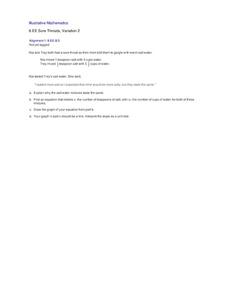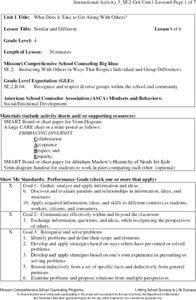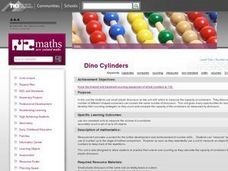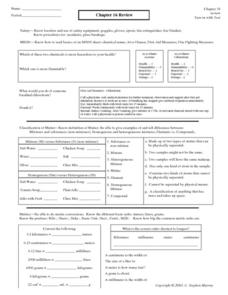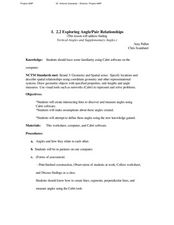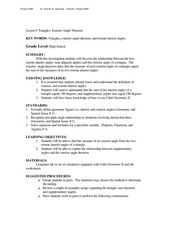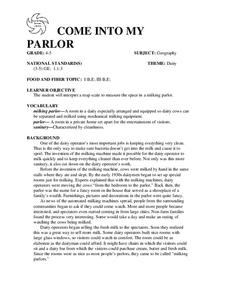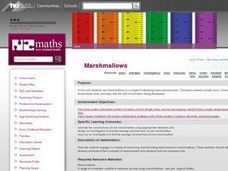Illustrative Mathematics
Sore Throats, Variation 2
What does math have to do with a sore throat? When you mix water and salt you have a great review of how to represent proportional relationships by an equation or graph. Here the proportions of the mixtures may be different, but the...
Teach Engineering
Android App Development
Building an accelerometer app for your Android device. Groups develop an app that uses the accelerometer on an Android device. The purpose of the activity is to reinforce the programming design. The post activity assessment challenges...
Missouri Department of Elementary
So Much to Do, So Little Time: How Do I Tie All of the Loose Ends Together?
How do people manage to get everything done when there are so few hours in a day? Scholars explore the question as they participate in small group discussions about time management. They construct a daily schedule and complete a...
Missouri Department of Elementary
The Problem Solving Game
Creativity, communication, cooperation. Pupils assume the role of employees at a game factory working together to develop a new game. Using the principles of the STAR method (Stop, Think, Act, Review), they work in teams to create game...
Missouri Department of Elementary
What Does Respect Look Like at Home?
Individuals consider why is it important to respect family members as they complete a self-respect survey to assess their respectful behaviors at home. They then choose three items from the survey and write about how they plan to improve...
Missouri Department of Elementary
Similar and Different
Using a Venn diagram, pupils compare the similarities and differences between two classmates. Next, they review the CARE acronym (Collaboration, Acceptance, Respect, Empathy) and discuss how it applies to diversity in the classroom.
Curated OER
Math is Everywhere: Part 2
Second graders identify shapes and measurements in everyday life. In this measurement lesson, 2nd graders locate rectangles in their classroom and use standard and nonstandard forms to measure them. Students view a video clip...
Curated OER
Pounds and Ounces: It's All About Weight
First graders explore number sense by participating in a measurement estimation activity. In this weight lesson, 1st graders discuss the differences between measurement units, both English and Metric. Students examine a loaf of bread to...
Curated OER
Customary Measurement Conversions
Fifth graders discover in hands-on activities the relationships between the measures. They work in groups to create conversion tables using familiar measuring tools. Students solve problems requiring conversions.
Curated OER
Is It There?
Students participate in a lesson designed to illustrate these concepts using simple materials. They use Science process skills to observe, measure, predict, make inferences, and communicate while completing the activity. Proper safety...
Curated OER
Dino Cylinders
Students investigate the capacity of containers using small dinosaur figures as the unit of measure. They work with a number of different shaped containers to compare the capacity as they practice counting the dinosaurs. They complete an...
Curated OER
A Trillion Here...A Trillion There
In this working with large numbers worksheet, students are given the finance statistics for the US and the world for the 2006-2007 year. Students solve 11 problems including finding averages and percentages for the given statistics and...
Curated OER
Introducing Angles
Sixth graders identify, compare and interpret the characteristics of polygons and angles in order to meet spatial sense, geometry and measurement standards. They also sort shapes into three categories, polygons (regular and irregular)...
Curated OER
Chapter 16 Review- General Science
For this review of general science worksheet, students classify examples of matter as mixtures or substances, homogeneous or heterogeneous mixtures, or elements or compounds. Students also convert several examples using the standard...
Curated OER
Fictional Hereos
Students are introduced to the definition of a hero. As a class, they compare and contrast the difference between non-fictional and fictional hereos they have read about. They read a story, create a story map of one of the heroes and...
Curated OER
Biodiversity
Students complete activities to study the importance of biodiversity. In this biodiversity lesson plan, students find images to categorize into organism groups and illustrate their interconnections. Students use measurement tools to...
Curated OER
Exploring Angle Pair Relationships
Young scholars investigate the relationship between angles of triangles. In this geometry lesson, students identify properties of right and non-right triangles. They differentiate between vertical and supplementary angles.
Curated OER
Pesticides in Schools
Students investigate the practices their school uses for pest control. Depending on their findings, students may suggest alternative, non-chemical methods. They present a pest control plan to school officials. Great, real life lesson!
Curated OER
Reading Through Rainforests
Learners investigate the concept of the rainforest through the use of nonfiction texts. The teacher reads to the class to give some information. Then they read their own books to find further information and perform the follow activities...
Curated OER
Triangle Exterior Angles Theorem
Students identify the measure of missing exterior angles. In this geometry lesson,students define and apply the exterior angle theorem to solve problems. They use Cabri software to create different angles and make investigations.
Curated OER
Altimetry
Fifth graders accurately measure the distance to eight points on an uneven surface by conducting a simulation of sattelite altimetry. They create a two-dimensional model of the simulated ocean surface by graphing data from the Radar Run...
Curated OER
COME INTO MY PARLOR
Students interpret a map scale to measure the space in a milking parlor. They reveiw the process of using a map scale to calculate distances. Students are given worksheets, they read the information in the box together. They draw an...
Albert Shanker Institute
Economic Causes of the March on Washington
Money can't buy happiness, but it can put food on the table and pay the bills. The first of a five-lesson unit teaches pupils about the unemployment rate in 1963 and its relationship with the March on Washington. They learn how to create...
Curated OER
Marshmallows
Third graders estimate the volume and mass of one marshmallow using appropriate standard units. They design and carry out an investigation to find the average of volume/mass of one marshmallow.


